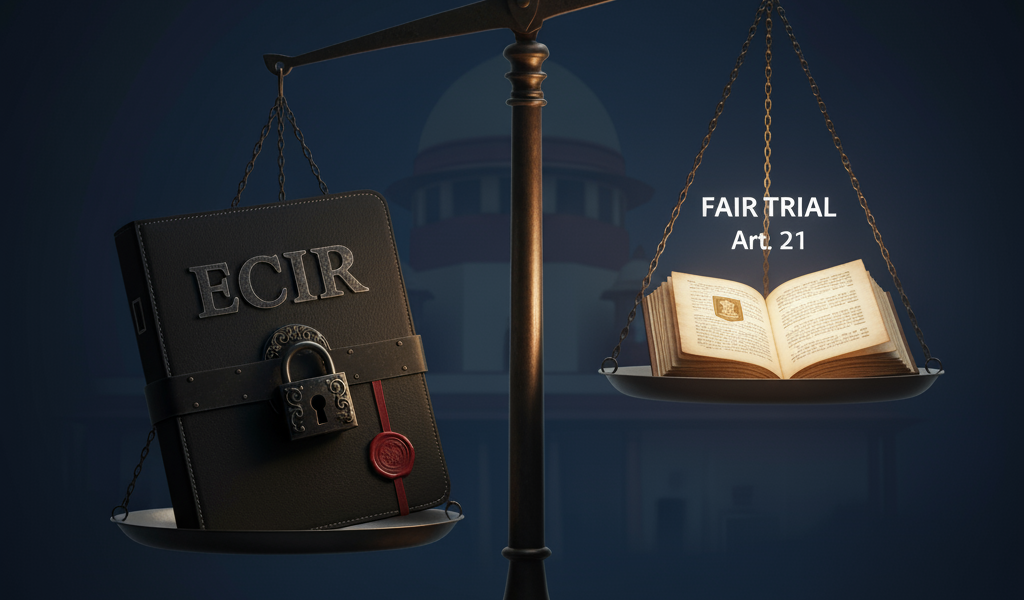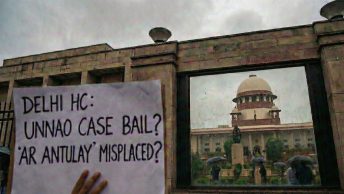Background
After multiple review petitions against the judgment in Vijay Madanlal Chaudhary, the Supreme Court is hearing a review petition in Kirti P Chidambaram. A full bench of the Supreme Court is set to hear the review petition on 25th September, 2025. The petition is primarily raising the issue of disclosure of the Enforcement Case Information Report (“ECIR”) to the accused. Vijay Madanlal, with several other judgements, has held that ECIR is an ‘internal document’ and there is no statutory mandate to disclose ECIR, and hence, the accused cannot claim its disclosure as a matter of right, because (i) Money laundering is a continuous offence, so premature disclosure could allow property to be further tainted; (ii) Grounds of arrest are disclosed to the arrestee u/s 19 of the Prevention of Money Laundering Act, 2002 (“PMLA” / “the Act”) orally immediately after arrest and in writing within twenty-four hours of arrest; and after the complaint is filed u/s 44(1)(b) of the act.
Recently, Sarla Gupta mandated ED to disclose all the relied documents to the accused u/s 207 Criminal Procedure Code, 1973 (“CrPC”) (now, Section 230 Bhartiya Nagarik Suraksha Sanhita, 2023 (“BNSS”)), but did not comment anything on the disclosure of ECIR. Notably, the statute does not even explicitly prohibit the disclosure of ECIR. As a matter of practice, in cases where arrest do not take place, the ECIR is disclosed only after the complaint is filed u/s 44(1)(b) of the Act. This is at variance with the accepted international standards. ICCPR Art. 14(3)(a) and UDHR Art. 11 lay down that such information must be communicated ‘promptly’, which is further interpreted by ECtHR as “at the beginning of the preliminary investigation” or as soon as a “clear official suspicion” arises. Such delayed disclosure not only violate right to fair trial enshrined under Art. 21 of the Constitution of India, but also international principles like equality of arms.
In this article, the authors argue that non-disclosure of ECIR violates accused’s right against self-incrimination, and also the right of the third-party investors against the arbitrary deprivation of property. The authors further argue that despite such violation, the accused do not have any effective remedy under PMLA, unlike Section 482 of CrPC (now, Section 528 BNSS).
Violation of the Right against self-incrimination
Since ECIR is not supplied to the accused during the investigation stage, any person who is summoned by the Enforcement Directorate (“ED”) u/s 50 of the Act for investigation is unaware whether he has been summoned as an accused or as a witness, and hence he cannot effectively prepare his defence, as there is a possibility that person who is summoned by the ED in whatever capacity can be implicated as an accused post-filing of complaint.
Furthermore, Vijay Madanlal has also settled the principle that ED is not a ‘police officer’ and thus, any statement by the accused during the investigation does not enjoy the protection u/s 161 of CrPC (now. Section 180 BNSS) and u/s 24, 25, 26 of Indian Evidence Act, 1872 (now, Section 22 and 23 of Bhartiya Sakshya Adhiniyam, 2023), and hence can be used against him in the court. This violates the accused’s right against self-incrimination u/a 20(3) of the Constitution.
Moreover, the ED argues, and the courts accept the argument, that PMLA bestows the status of ‘accused’ only after the complaint is filed by ED u/s 44(1)(b) of the Act, and hence, the accused can enjoy his statutory safeguards only after the complaint procedure, and not during investigation. The Supreme Court in Ramesh Chandra Mehta assessed powers u/s 171A of the Sea Customs Act, which is pari materia to Section 50 of the PMLA, and held that the phrase ‘any person’ u/s 161 of CrPC includes those who are merely suspects of involvement. Crucially, however, such individuals, when summoned to produce evidence or give statements, do not yet constitute ‘accused’ within Article 20(3) of the Constitution, as no formal accusation had been made at that stage. Only the filing of a complaint or FIR would bestow that status. Hence, the protection u/a 20 (3), 22 of the Constitution is enjoyed by the ‘accused’ only after the complaint, and the statement made u/s 50 of the Act is admissible. However, this is in contrary to the settled principle that even suspect enjoys safeguards under the Constitution.
Consequently, the right to remain silent during investigation cannot be exercised when an individual is summoned u/s 50 of the Act, and any non-cooperation by him may lead to punishment u/s 63 of the Act. This contradicts the Apex Court’s stance in Nandini Satpathy, which lays down that the accused person has the right to remain silent even during the stage of investigation.
Arbitrary Penalizing of Third-party investor
The disclosure of ECIR is relevant not only for the accused but also to the third-party investors. In various cases, the ‘proceeds of crime’ affect other individuals who have invested in such property for genuine commercial reasons. When rental income and access to such assets are frozen without providing the opportunity to be heard, or the opportunity to withdraw one’s own invested asset, it violates Article 17 of the UDHR, which prohibits arbitrary deprivation of property and Art. 300A of the Constitution. Even though deprivation of property in PMLA proceedings is backed by an Act, it can still be held arbitrary if it is not in a just, fair, and reasonable manner.
Vuenow Infratech is one such recent example. The business model of Vuenow is such that individuals buy part ownership of data servers in form of cloud particles by paying sum of amount and accordingly, in lieu of it, receive monthly rental income. ED alleges that Vuenow defrauds investors through Ponzi schemes and appropriate their funds into other businesses. Hence, post-confiscation of Veunow’s property by the ED, the investors could not receive their rental income deriving from that asset. In Vuenow’s case, had the ECIR been supplied to the accused, the interests of third parties could have been protected, as the ED could have directed the accused to inform all investors about the potential actions contemplated by the ED that may affect third-party interests. This would include investors who have invested in the concerned property or assets, or who are deriving any benefit from them, such as rental income as happened in the Vuenow’s case.
Through this procedure, the rights of innocent third-party investors, who are otherwise unconnected with the alleged offence, could be safeguarded. By being made aware of the possible seizure of assets in which they have invested, such investors would have the opportunity to approach the appropriate authority and seek protection of their interests. Thus, disclosure of the ECIR to the accused, followed by its communication to innocent third-party investors, would have mitigated their losses arising from the ED’s action against the accused.
In Deputy Director, Directorate of Enforcement of Delhi v. Axis Bank & Ors, the Delhi High Court acknowledged the predicaments of bona fide third-party investors who are adversely affected by attachment of property by the ED. The Court emphasized that protection could be extended to such third parties, provided they are able to establish that their interest in the property was acquired prior to the commission of the scheduled offence and due diligence was exercised by them to ascertain that the property in question was not tainted, and that the transaction was legitimate at the time of acquisition. Once these facts are duly established, such third parties may seek release of the property from attachment.
Furthermore, recently, in Kolkata Municipal Corporation & Anr v. Bimal Kumar Shah, the Supreme Court laid down seven procedural sub-rights against the arbitrary and illegal land acquisition, including right to notice. While this judgment was given in the context of land acquisition, the principles squarely apply to cases where any person is arbitrarily deprived of any such property, even for the purpose of investigation.
No effective remedy for Aggrieved under the PMLA
Unlike FIR which can be quashed u/s 482 of CrPC (now, Section 528 BNSS) if prima facie no case is made out against the accused, the accused under PMLA does not have the privilege to avail such a kind of remedy, as registration and disclosure of ECIR is not a statutory mandate. If the case is frivolous from the very beginning or filed maliciously to coerce the accused person, even then, the accused cannot challenge ED’s action of registering ECIR that forms the basis for the investigation of the predicate offence. Consequently, this deprives the accused of an effective remedy u/a 2(3) of the ICCPR. In Estamirov and Others v. Russia, the ECtHR held that the State must produce all relevant documents and provide accessible mechanisms to challenge its actions.
Further, in Monika Kumar v. State of UP the Supreme Court upheld the view that HC exercises its power u/s 482 of CrPC to prevent abuse of process of any court or to secure ends of justice. However, in cases of ECIR, no such power can be exercised by HC thereby depriving the accused of the effective remedy to challenge the abuse of process of any court against him at a pre-trial stage as available in case of FIR. Consequently, the withholding of ECIR circumvents the judicial scrutiny of the ED’s actions at pre-trial stage, leaving the accused with no remedy for immediate relief and quashing of case even where the action against him is malafide or frivolous.
Way Forward and Conclusion
The debate over disclosure of the ECIR goes far beyond a narrow procedural question. It strikes at the heart of how India balances state power with individual liberty. By treating the ECIR as an “internal document,” Vijay Madanlal Chaudhary encourages a culture of non-disclosure that prioritises investigative convenience over fairness. This approach is unfair in the eyes of the law, as the Constitution does not recognise a lesser standard of justice simply because the offence alleged is economic in nature.
The implications of such non-disclosure are serious. First, it creates a double standard in criminal law: while every other accused in India is entitled to know the basis of the case against them, a person under PMLA is expected to cooperate without even being told whether they are a suspect or a witness. Second, it hands the ED with vast unchecked discretion, exposing both accused persons and innocent third-party investors to uncertainty and arbitrary deprivation of property. Third, it places India at odds with international standards of due process, where early disclosure of charges is seen as central to the right to a fair trial.
The way forward must be both principled and practical. Parliament should step in to clarify that ECIRs must be disclosed at the stage of summons itself. The law must also provide for notice to third-party investors, ensuring they are not blindsided by attachments or seizures. Until such reforms are made, the judiciary can recalibrate the balance by reading the right against self-incrimination more broadly, applying it from the stage where an individual is officially suspected, not only after a complaint is filed, even in the cases of PMLA. The High Courts should also be empowered, in line with their inherent powers u/s 482 CrPC, to intervene where an ECIR is registered in bad faith or without sufficient grounds.
Atharva Shukla is a penultimate year student at Maharashtra National Law University, Nagpur. His core interest lies in Corporate and Commercial Laws and Laws related to White Collar Crimes.
Shrushti Taori is a final-year student at Maharashtra National Law University, Nagpur. She has a deep interest in Indirect Taxation and enjoys critically interpreting the law and engaging with the technical complexities of the subject.
[Ed Note: This piece was edited by Hamza Khan and published by Vedang Chouhan from the Student Editorial Team.]Disclaimer: The views and opinions expressed on this blog are those of the authors in their personal capacity.






